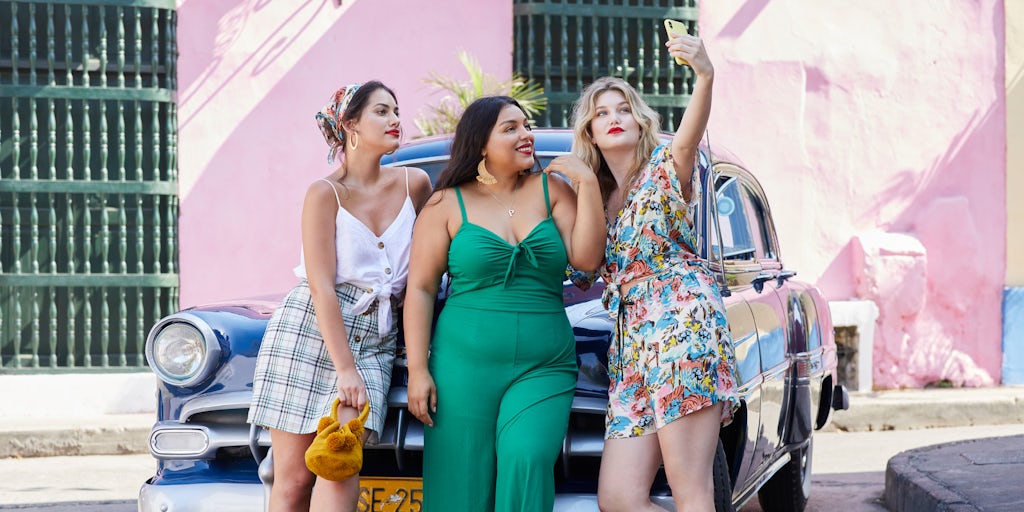The Oula Company Turning Ankara Wax Cloth Into Contemporary Fashion – WWD
Erika Dalya Massaquoi has gone from curating and teaching fashion, as the former assistant dean of the School of Art and Design at FIT New York, to living it as the founder of The Oula Company.
Using her appreciation of the history of Ankara wax cloth, and inspiration from the Black Is Beautiful movement of the ‘60s and ‘70s, she’s building a contemporary brand based on high-quality cotton, easy-to-wear tops, and short and midi dresses in joyful, graphic, Mod-dish prints.
Last week, she finished a series of personal appearances in Nordstrom stores, which had her traveling to New York, Houston and Los Angeles to host lunches with friends, influencers and staff members, to educate them about her line, which sits next to Farm Rio, Staud and others. Prices are $225 to $375.
For the events, she designed tablecloths and napkins, and gifted earrings, hinting at where she wants to take her growing lifestyle brand, founded in 2015 and named after her great-great-grandmother Lula.
“I was introduced to African wax fabric through the dashiki, which when I was young you could buy at Sears and Bloomingdale’s,” she said, remembering her mom wearing them in the ‘70s. “It was seeing Cecily Tyson and Aretha Franklin in their beautiful caftans with their hair, and seeing those spreads in Ebony magazine.”
Dutch by birth, what is now a symbol of African fashion was first produced in the 1800s in factories in Helmond, The Netherlands, in an attempt to industrialize Indonesian batiks to be sold in Asian markets, Massaquoi details in her company explainer. Although it was unsuccessful in Asia, the Dutch found a robust market for the fabric in Ghana, and it spread along the West African Coast, morphing into its own creation with African motifs and colorways. African women wore and traded the fabrics, giving them their own meaning and names, beyond the colonial heritage.
“My family, they weren’t wearing Ankara everyday like I wanted to; [they wore it] just for special events, birthday parties and weddings,” said Massaquoi, who grew up in Miami. “I wanted to create a brand where I could wear it every day and share the electricity and the vibrancy and joy with everybody.”
The collection also includes mix and match separates.
“There are a lot of lines celebrating our cultural heritage through textiles, but I wanted to do it in a way that was easy and reserved and not too busy. I sent a dress to boothmoore6196 Constance White, and I was, like, wear this to the bodega in Brooklyn,” the designer said.
The Oula Company
Courtesy
As a New Yorker for 20 years, Massaquoi curated art and culture exhibitions at the Whitney Museum of Art, the Studio Museum in Harlem, and taught at FIT, bringing her Ph.D. in cinema into the fashion discussion.
She moved to Seattle in 2008, continuing to curate for the Seattle Art Museum, the Frye Museum and many more. Then, during the pandemic, she and her family relocated to Denver, where she started getting noticed for her printed face masks.
Nordstrom came calling. In February 2021, she started selling at two stores, then expanded to five and then 10 stores. In one year, Oula has more than doubled its seasonal order volume.
“When I started, I would use my money that I had from curating and I would create a collection every summer. And it was fun.…I was working at my own pace. But now I’m consistently delivering a collection every season, and our commercial business has legitimately begun.”
The Oula Company
She sources her fabrics from ethical partners in India, honoring its history in African-European-Asian cultural exchange, and manufactures the collection in L.A.
The pieces are breezy but substantial, and don’t wrinkle.
“There is a moment of having to sort of educate the customer because the fabric is so thick, and people are used to wearing polyester and other lighter fabrics. It’s just a different experience for people,” she said. “But once you get the dress on a customer, it’s sold.”
In May, Massaquoi was invited to join McKinsey and Company’s accelerator program for Black founders.
“I’m organizing all my collections so I can photograph them properly…and then I will start fundraising for Series A. Our next collection is going to be resort, and they want to increase the numbers for that,” she said. “I’m so thankful for the collaboration with Nordstrom where they pushed me to scale, but without me in any way sacrificing the quality of the product.”
Maisonette has reached out to collaborate on mommy-and-me pieces, and she’s working with her L.A. factory on printing on jersey, to bring her aesthetic to more sporty pieces. Massaquoi also wants to bring more storytelling to her brand, through social media and videos, and dreams of writing a coffee table book one day on how Ankara has traveled from the African diaspora into popular culture through the decades.
But next up, she’s aiming to secure more wholesale accounts with the help of a few fashion world contacts and mentors, including designers Jeffrey Banks and Mimi Plange.
“I imagine each collection as an art installation. And the whole point is for the prints to clash,” she said, noting that part of the fun of traveling to stores was seeing how people styled the pieces. “In Houston, it was a young mother who wore the dress with her cute little Valentino sneakers, and then there were older Ladies Who Lunch buying the longer dresses. In New York, the mom bought the caftan and the tween bought the minidress. It truly does cross age groups and ethnicities.
“I’m really glad that I didn’t waste time at the beginning trying to figure out who my customer was,” she continued. “As people become more exposed to it and fall in love with it, intuitively, I just sort of know what to do.”
The Oula Company
Courtesy/Victoria Kovios Mosely








